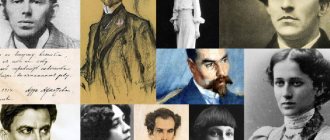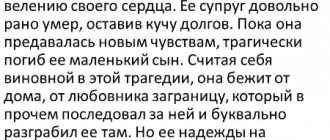Appearance and behavior
As befits a well-trained servant, Firs is neat and clean, as the nobles who dominate him taught him. The old footman went to meet his mistress Lyubov Andreevna Ranevskaya, who had returned from Paris, dressed in an old livery and a tall hat. In the house he wears a jacket, white vest, and shoes. Before serving the gentlemen at the table, he puts on white gloves. At a ball hosted by Ranevskaya, Firs serves in a tailcoat and serves seltzer water to the guests.
Despite the fact that Firs is leaning on a stick, he walks hastily, trying to have time to please his masters and take care of them. At 87, he is hard of hearing and mutters quietly to himself. His mind has not yet been clouded by senile insanity and other “charms” of old age.
Character, outlook on life
Firs represents the past. It is thoroughly imbued with antiquity, not only physically, but more from an internal feeling. Firs was born and lived the first half of his life under serfdom. He calls the abolition of serfdom a misfortune; he still remembers the mysterious signs that, in his opinion, foreshadowed this misfortune: an owl screamed and the samovar hummed continuously. This is a sign that the hero is a fatalist by nature - a person who completely worships fate, who believes that something has been “predestined” for him from above.
Born a servant? Know your place. Nature doesn't have bad weather. It does exactly what it should: arranges living beings into hierarchies. To the judicious and rational Firs it seems fair and logical that a small percentage of people dominate, and the majority submit to the will of others only on the basis of ephemeral status, being chosen by God, etc. His thoughts are based on traditions and customs accepted in society. Essentially, from those things that cannot be rationally comprehended, but only need to be accepted, merging with society.
Serfdom for this old servant is the embodiment of stability, reliability, and order. In this he is similar to Ipat, a character in N. A. Nekrasov’s poem “Who Lives Well in Rus'” (chapter “The Foundling”). Both of these serfs did not approve of the abolition of serfdom; they wanted to continue to be faithful slaves of their noble masters.
Firs's attitude towards the cherry orchard is a symbolic attitude towards the old time, the old order. He recalls how earlier on the Ranevsky estate they made jam from cherries, pickled them, soaked them, and sent the dried ones by carts to Moscow and Kharkov, and this brought great benefits. Then they knew a way to dry cherries so that they were juicy, soft, and fragrant, but this method has already been forgotten.
Despite the oddity of his character, the old footman deserves respect for those character traits with which he is gifted in abundance - honesty, patience and hard work. It also honors the memory of the parents of the current owners of the estate.
Option 2
Firs in this work is more of a positive character. Compared to others, he surprises with his own common sense.
He is an elderly servant who is already eighty-seven years old. His character can be distinguished by calmness, evenness, rationality and diligence. He lives at a time when serfdom was abolished. For Firs this is a complete tragedy. The fact is that the old servant serves his masters very faithfully. He doesn't understand innovation. For him, such a relationship was always clear when there are masters who give orders and servants who carry them out. If everyone has their own responsibilities and rules of behavior, then there will always be order in the country. When such a hierarchy is violated, the adherents of the old traditions will not understand what to do. After all, they existed for a long time together with old customs, to which they were quite accustomed. Therefore, recently, after the serf reform, Firs feels oppressed. He doesn’t know what to do, because now no one needs him. Therefore he is very sad.
However, the old servant knows very well that Gaeve and Ranevskaya will not be able to cope without his help. He always served them, they practically did nothing on their own. So far, they have become so mature emotionally that Firs leaves work with peace of mind. And Gaev is not even able to put on the pants he needs, despite the fact that he already has fifty dollars! It is only because these two have not yet embarked on the path of independence that Firs is still working as a servant.
Firs also has a special relationship with the cherry orchard, the main subject in this work. The old man associates with him his best years, when he was still a young servant. There used to be a strong and friendly world there, with its inhabitants and traditional foundations. This garden has very little time left and it will no longer exist.
Attitude towards others
Firs treats his masters with great love; they are the closest people to him. When Ranevskaya arrived, who had not been to the estate for five years, Firs even cried with joy. “My lady has arrived! Waited for it! Now at least I can die...” he says joyfully. The old servant tries to serve Lyubov Andreevna as best as possible: he himself fusses around the coffee pot when she wants coffee, puts a pillow under her feet to make it comfortable.
According to tradition, Firs teaches young people based on his valuable experience as a person who has known a lot of things in life. Mr. Gaev is over fifty years old. But this does not in the least prevent the old lackey from caring and being needed by the carefree Leonid Andreevich. He really takes care of Gaev: he makes sure that the owner goes to bed on time, undresses and dresses him himself, cleans his clothes with a brush, makes sure that he dresses for the weather, brings him a coat and makes him put it on so that he doesn’t catch a cold. Even remaining forgotten in the boarded-up house, the old servant worries that he did not look after Gaev and that he rode in a light coat, and not a fur coat. He often says about Leonid Andreevich: “Young and green!” Firs cares so much about his master and talks to him like a child, instructively, sometimes even reproachfully, that Gaev once told him: “I'm tired of you, brother!”
Firs has a formed opinion about the relationships between people. The strongest are - no, not family or even friendly - but the relationship between slave and master. The old servant is only for close relationships, because he has no one else except his masters. But what about freedom - the inalienable right of any person? For some this is a right, but for Firs there is an incomparable feeling of unhappiness and abandonment. He calls the abolition of serfdom a misfortune and says that “he did not agree to freedom, he remained with the masters.”
Firs treats the maid Dunyasha strictly. When she reported at a ball that a postal official had paid her a compliment, the footman warned her to be careful: “You’ll get twisted.”
Firs calls Dunyasha a klutz when she forgot to bring cream for Ranevskaya’s coffee, and Yasha when he said that Firs was boring him. And finally, at the end of the play, finding himself locked in a boarded-up house, he says to himself: “Oh, you... klutz!..”
Fate of Firs
Firs lived all his long life on the Ranevsky estate and served these nobles. He did not wish for a different fate for himself, and was not burdened by his serfdom. This man loved his masters with all his soul. When serfdom was abolished in Russia, Firs did not agree to leave the Ranevsky estate and served his masters as before. He was the senior valet, and there were servants under his command. Now there are no numerous servants on the estate of the impoverished Ranevsky nobles, and Firs complains that he is the only one in the whole house. When Ranevskaya, seeing that he is unwell, sends him to bed, the old footman says with a grin: “...and without me, who will serve, who will give orders? One for the whole house."
Firs considers himself a manager in the house. So what, what about a lackey? Any master would consider such a servant a gift from fate. In fact, Firs cannot control anything or anyone while in a subordinate position.
Firs is so submissive to his masters that he is not able to think about his future life after the sale of Ranevskaya’s estate. “Wherever you order, I’ll go there,” he says to Lyubov Andreevna. The lady decided to send the sick old man to the hospital, but did not care where he would live later.
As a result, Firs, who at the beginning of the play rejoiced at the lady’s arrival and said: “I’ve waited! Now at least I’ll die…” – indeed, he’ll be forced to die in a boarded-up house. His masters, whom he served faithfully all his life, did not bother to find out for sure whether Firs was sent to the hospital.
The old footman, realizing that he was left alone in a boarded-up house, says to himself: “Life has passed, as if he had never lived. <…> Eh... you klutz!..” He wanted to die in the estate of his beloved gentlemen, and, indeed, the gentlemen, although not intentionally, leave him to die in a boarded-up house.
The role of the image of Firs in the play is that his memories of former times emphasize the insolvency and spiritual emptiness of the current owners of the estate. The fate of Firs is a verdict on the lack of spirituality of the nobility.
“What is the significance of the image of Firs in the play “The Cherry Orchard””
The faded joy of crazy years is heavy on me, like a vague hangover. But, like wine, the sadness of days gone by In my soul, the older it is, the stronger it is. A.S. Pushkin The works of literary scholars most often present an interpretation of “The Cherry Orchard” from a historical or social point of view. The theme of the play is defined as follows: Chekhov shows the past, present and future of Russia. In accordance with these eras, the play has the owners of the estate (they go bankrupt, demonstrating complete helplessness), there is a new owner of life (an energetic, enterprising merchant), there are representatives of the younger generation (noble dreamers looking to the future). The idea of the play is the author’s assessment of the current state of Russia. It is obvious that Chekhov understands the inevitability of the end of the landed nobility (Gaev and Ranevskaya), sadly follows the activities of bourgeois businessmen (Lopakhin), but looks with hope into the future of Russia, which he connects with new people (Petya Trofimov and Anya), different from the previous ones, and from the real owners of the cherry orchard. These young people dream of planting a new garden in place of the old one, destroyed by Lopakhin for the sake of profits. Thus, in Chekhov’s last comedy, historical optimism is manifested, which was not present in his previous plays (“The Seagull”, “Ivanov”, “Uncle Vanya”).
Such a definition of the theme and idea of “The Cherry Orchard” is quite possible, but it would be wrong to say that Chekhov only laughs at the nobility leaving the public scene, condemns the modern “masters of life” and sympathizes with the younger generation, which is hastening the arrival of a new life. It seems that the playwright's attitude towards his characters is more complex than unequivocal condemnation or sympathy.
Take, for example, the image of the valet Firs. This hero, of course, belongs to the passing Russia, since for more than fifty years he has faithfully served the owners of the cherry orchard, and he also remembers the grandfather of Gaev and Ranevskaya. Not only by age, but also by conviction, he is an adherent of the old order, the old way of life. It is remarkable that a hero similar to Firs has already been depicted in Russian literature - this is the courtyard Ipat, the lackey of Prince Utyatin from the poem by N.A. Nekrasov “Who Lives Well in Rus'” (chapter “The Last One”). After the announcement of the “Manifesto,” Ipat renounced personal freedom and wished, as before, to serve his masters, the princes. Firs calls the abolition of serfdom a “misfortune” and says that in 1861 “he did not agree to freedom, he remained with the masters” (II). Ipat, with tears of tenderness, recalls the habits of the serf-owner master: how the young Prince Utyatin harnessed Ipat to his cart instead of a horse or bathed him in a winter river. And Firs remembers with emotion the tyranny of the late master, who imagined himself to be a doctor and treated all patients with sealing wax. The old servant firmly believes in this medicine and believes that it is thanks to sealing wax that he lives so long (III). However, Ipat’s servility evokes satirical ridicule in Nekrasov’s poem, and Firs’ behavior evokes the author’s calm understanding in Chekhov’s play.
The slavish psychology in the old man is combined with a touching attachment to his masters. Firs sincerely cries when meeting Ranevskaya (I), whom he has not seen for five years, and diligently continues to serve the fifty-year-old “child” Gaev. The old man sadly remarks to him: “They put on the wrong trousers again. And what should I do with you! (I). Even when he is forgotten and he is left to die in a house locked for the winter, he worries about the owner: “And Leonid Andreevich, I suppose, didn’t put on a fur coat, he went in a coat... I didn’t look... It’s young and green!” (IV).
Having lived his whole life on the estate, he cares about the prestige of the house and the good reputation of the owners. At the ridiculous ball organized by Ranevskaya on the day of the auction, he is exhausted, but serves the guests as expected. When Ranevskaya sends him to rest, Firs replies with a grin: “I’m going to go to bed, but without me, who will give it, who will give orders? One for the whole house” (III). And he is right, since Yasha blithely walks around the rooms, and Dunyasha dances with the guests. The old servant is even offended for his current masters, who are no match for the former: “Before, generals, barons, admirals danced at our balls, but now we send for the postal official and the station master, and even they are not willing to go” (III).
Next to Firs, the play shows a servant of modern times - Yasha, a stupid and smug guy. He visited Paris and, having tasted the delights of European civilization, began to despise his fatherland and was ashamed of his peasant origins. Yasha asks Ranevskaya to take him with her to Paris again, and complains: “It’s absolutely impossible for me to stay here. What can I say, you are miles away, the country is uneducated, the people are immoral, and, moreover, boredom, the food in the kitchen is disgraceful...” (III). Yasha himself is an insignificant person and a loose servant, as evidenced by his behavior at the ball. He never took Firs to the hospital, because the unlucky lady Ranevskaya has a non-executive footman. But in the last act, showing his “knowledge and skills,” he declares to Lopakhin that the champagne is not real, and he alone drinks the entire bottle. At the beginning and at the end of the play, Chekhov shows Yasha’s attitude towards his mother, who comes to see him on the day of his arrival and departure. The reminder of his mother waiting in the kitchen only causes annoyance for a lover of Parisian life. In comparison with this lackey, Firs looks like a conscientious, devoted servant, and a wise man.
Chekhov entrusts the old valet with several very important statements that clarify the author's intent of the play. Firstly, the love of order in everything (in service and in life) is what distinguishes Firs. And in his old age, he sees the senseless bustle around him and wonderfully characterizes the order both in the manor house and in the surrounding Russian life: before everything was correct, “the men are with the gentlemen, the gentlemen are with the peasants, but now everything is fragmented, you don’t understand anything” (II) . This feeling of fragility and confusion is experienced not only by the old man, but also by Lopakhin, who has just fulfilled his dream (bought a cherry orchard at auction) and is also complaining about his awkward, unhappy life.
Secondly, Firs calls all the characters in the play and himself, in accordance with the author’s intention, “klutzes” (III), that is, fools who do not understand life. An example of the bad luck of all the characters is their attitude towards the cherry orchard. Firs sees the garden as it was in the irrevocable past; for Gaev, talking about the garden is a reason for empty boasting; Lopakhin, thinking about saving the garden, cuts it down; Anya and Petya prefer to dream of new gardens rather than save the old one.
To summarize, it should be said that Firs is an integral part of the noble estate where the play takes place. The old valet is a type of faithful servant, which is represented in very diverse ways in Russian literature: Nanny Eremeevna from “The Minor”, Nanny Filipevna from “Eugene Onegin”, Savelich from “The Captain’s Daughter”, Zakhar from “Oblomov”, etc. Firs is Gaev’s servant and at the same time an exponent of the author’s idea. This hero is a man of old Russia, in which there was serfdom, but there was also a high spiritual culture. Therefore, the image of a faithful servant turned out to be multifaceted.
Chekhov was against the sweeping denial of the old life, and even more so its violent destruction; at the right time, it itself will give way to new orders. This author’s idea is proven by the last, poignant scene of the play: forgotten by everyone, a helpless old man dies in a locked house. At the same time, Firs does not reproach his careless masters, since he sincerely loves them. His death coincides with the death of the cherry orchard and symbolizes the end of the “noble nest”, the end of an entire era, the keeper of which was the old servant.



